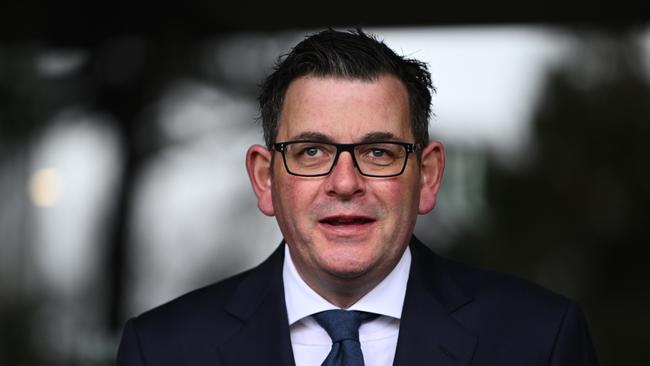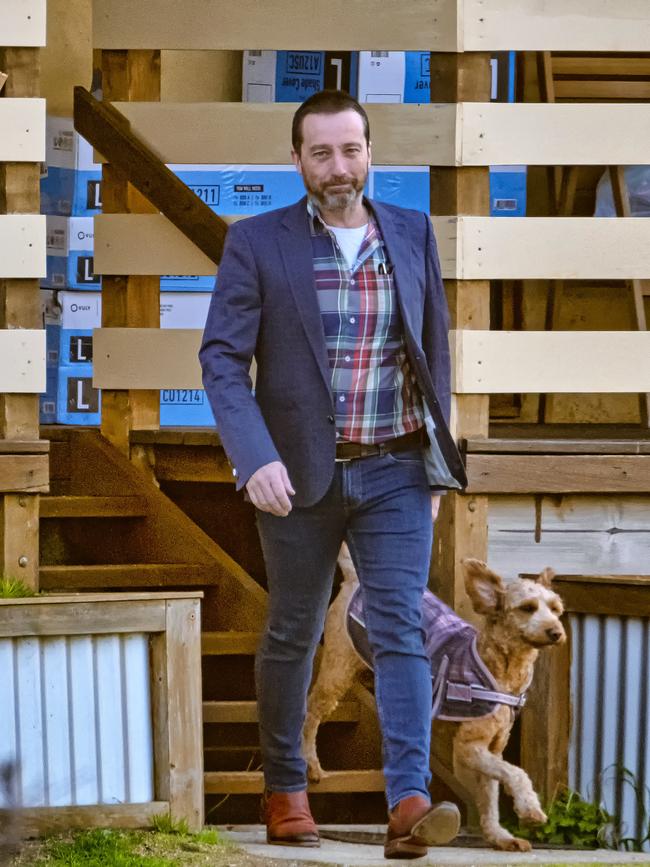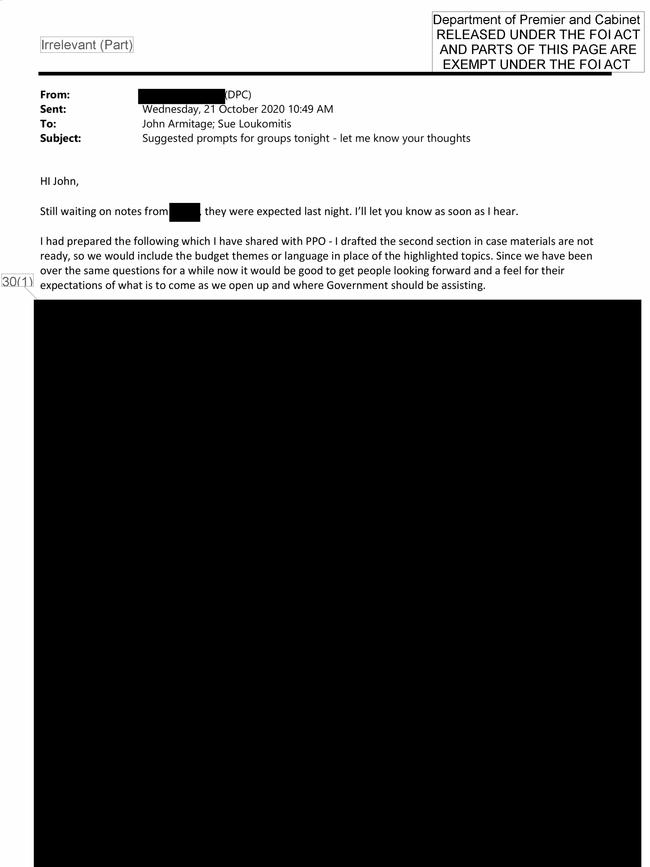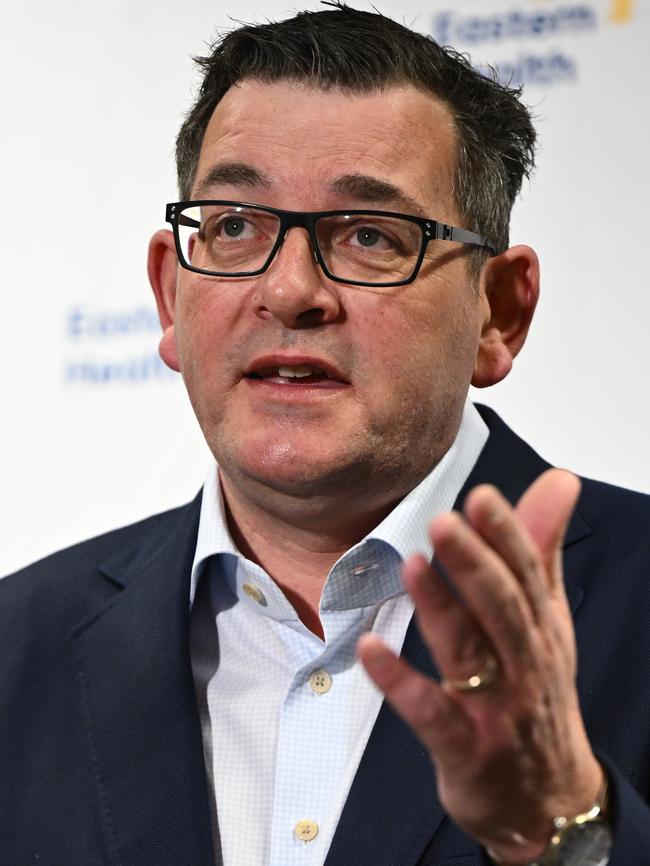Email clue to secret Daniel Andrews Covid lockdown surveys
Daniel Andrews always said lockdowns followed health advice, but an email suggests his tough pandemic response was also influenced by secret public surveys.

The Victorian Premier’s strategic communication manager hits send and dispatches the email to John Armitage and Sue Loukomitis. It’s 10.49am, Wednesday, October 21, 2020.
The day before, Daniel Andrews had confirmed to Melbourne’s traumatised millions the 112-day lockdown was in its final week and he would unveil the exit road map within days.
Covid-19 infection numbers were tracking down, with just one new case and zero deaths from coronavirus in the previous 24 hours. The city’s rolling 14-day average had fallen to 6.4.
“I think we’re well placed to reach the point on the weekend where we can talk more and possibly bring forward some of those changes that were slated for November 1,” the Premier said that Tuesday.
But ahead of the unveiling of the lockdown exit strategy, it seems the Department of Premier and Cabinet was keen to know what the public was thinking. And the best person to find out was the Premier’s $2m man, John Armitage.
There was no one better equipped to find out where the people – the voters who on November 26 will determine if the Premier gets a third term – were at than Armitage, the founder, owner and chief of QDOS, and his research director, Sue Loukomitis.

Since 2016, the DPC has paid QDOS $2m-plus in taxpayer funds to monitor the views of Victorians, and when the pandemic struck in March 2020, the political strategy firm was quickly diverted to start large-scale polling of how Victorians were reacting to the crisis and how they rated the government’s response, including its leadership.
The 10.49am email to Armitage, with the subject line of “suggested prompts for groups tonight – let me know your thoughts”, opens with a reference to the budget, but then moves to the looming end of lockdown.
“Hi John,
“I had prepared the following which I have shared with PPO (Premier’s Private Office) – I drafted the second section in case materials are not ready, so we would include the budget themes or language in place of the highlighted topics.
“Since we have been over the same questions for a while now it would be good to get people looking forward and a feel for their expectations of what is to come as we open up and where Government should be assisting.”

Much of the two-page email has been blacked out by DPC censors who assert it is an “internal working document” and is therefore exempt from Freedom of Information. But it still opens a window into the Premier’s highly sophisticated and successful political intelligence machine that underpins pretty much everything the government does.
And it’s further evidence that QDOS was deployed to monitor the views of Victorians during the pandemic. Curiously, the email was only uncovered this week during legal action between the DPC and The Australian.
The document should have been included in 200 pages of redacted communications between QDOS, DPC and PPO released to the newspaper in July last year.
But it wasn’t. The DPC conceded the error this week after being challenged by the newspaper’s lawyers to hand it over. No explanation for the omission was given. The DPC has launched the legal action in the Victorian Civil and Administrative Tribunal to overturn (or at least delay the release until after the election) an order from Victorian Information Commissioner for a trove of QDOS documents to be made public.
Even with the heavy redactions, the documents and emails released so far provide strong evidence of the secret role QDOS surveys and the interpretation of that raw data played in shaping the government’s response to the pandemic, the Premier’s messaging, and, as is claimed by some Labor insiders, informed major tactical decisions such as holding more than 100 daily press conferences in a row.
QDOS detected, according to Labor sources, that Victorians were looking for strong leadership and The North Face press conference marathon spoke to that desire. They might not have liked what the Premier was saying but he turned up on the tough days to lead, so the theory goes.
QDOS trades on its ability to shape public opinion, change public behaviour, win elections and develop “persuasive language” for clients.
“Fortunately public opinion is a fluid thing that we can squeeze, pump and stir,” the firm boasts on its website. “The tricky bit is figuring out how to change what they think and how they behave.”
Armitage, who started working with Andrews when he was assistant state secretary of the ALP two decades ago, also urges political clients to “antagonise” opponents to rattle them.
The redacted documents also give an insight into the command-and-control leadership style of Andrews. Peppering the documents are references to the Premier’s Private Office that confirm it was heavily involved in framing and approving the questions, and even choosing the locations and demographics of the focus groups.
Here are some references:
“Please see below for the options I’ve provided to PPO.”
“If PPO wishes to add anything to this list, please let us know by around midday tomorrow.”
“Confirming the addition of the below prompts/topics to tonight and Thursday’s groups. PPO have approved.”
“Are you able to have a look at these before they go to the PPO?”
“Proposed survey changes – pending PPO confirmation of no additional questions.”
“This clean copy will then be provided to PPO for feedback.”
People familiar with how Labor premiers’ offices work describe the hands-on involvement in the surveys as highly unusual. They say that “tracking” polls were traditionally controlled by the bureaucracy and it was difficult for political staff to insert a political question.
QDOS’s point of contact in the PPO, sources say, is Jessie McCrone, the Premier’s deputy chief-of-staff. McCrone also attends Labor Party campaign committee meetings as the Premier’s proxy, according to leaked minutes of the minutes.
McCrone and her boss, chief-of-staff Lissie Ratcliff, have more access and wield more influence over the Premier than most members of the cabinet, sources say. This may not necessarily be unusual for apex leaders, but insiders say the Andrews office has taken this to the next level.

QDOS documents released earlier, indicate that Ratcliff and others from the PPO have tuned into livestreamed focus groups of Victorians during the pandemic.
In an email on May 25, 2020, Loukomitis wrote to two people in the PPO, including Ratcliff. (The second name has been redacted.) “Here’s the zoom link for tonight’s group (female living in South Yarra),” she writes. Without having the redactions lifted, it’s impossible to confirm who the second PPO invitee was.
Documents do show some questions asked by QDOS were focused on public health, community attitudes to washing hands, masks and the like. It’s not unreasonable that a government would want to test where the public was at on this.
But even with the heavy redactions, it’s clear that QDOS’s work was also political and designed to assess public reaction to specific lockdown measures such as curfews and restrictions on movement.
The Premier always stressed lockdowns were guided by health advice. QDOS documents indicate analysis of its research – in just one year, 1800 pages of raw survey data was sent to the DPC – was also part of the consideration.
The Australian has previously reported that in late August, Armitage briefed the eight-member crisis cabinet that Andrews still commanded strong public support despite the lockdown and hotel quarantine fiasco. The message was clear to the eight ministers, filter this QDOS research back to the caucus.
There is one more clue about the political nature of QDOS’s work: the fact the DPC is fighting so hard to block Victorians seeing the very research they paid for.








To join the conversation, please log in. Don't have an account? Register
Join the conversation, you are commenting as Logout